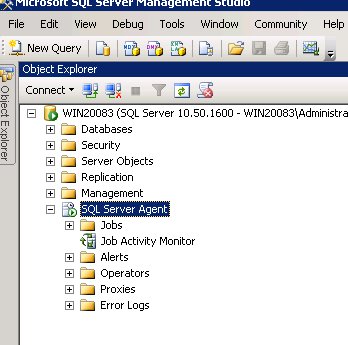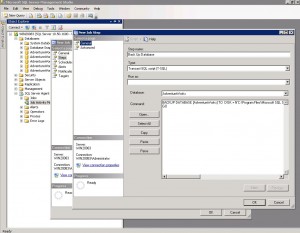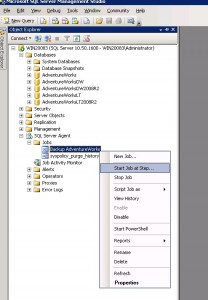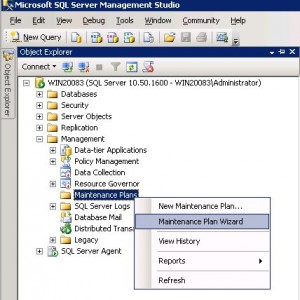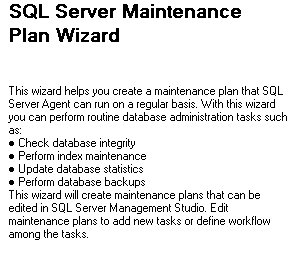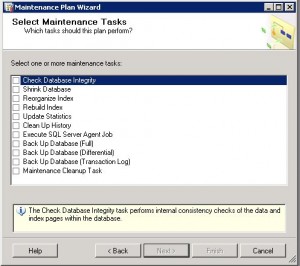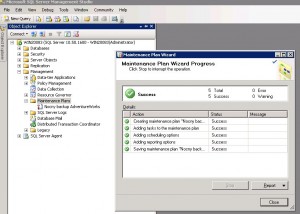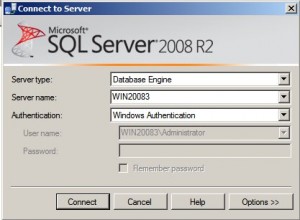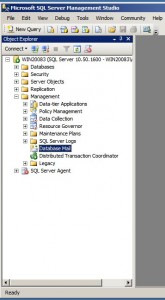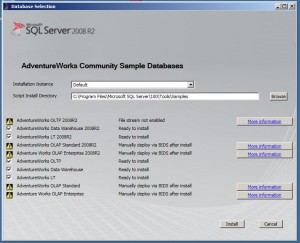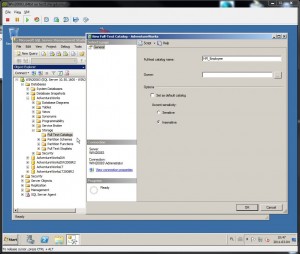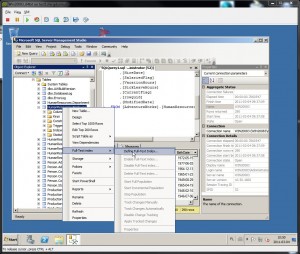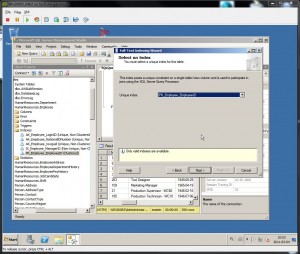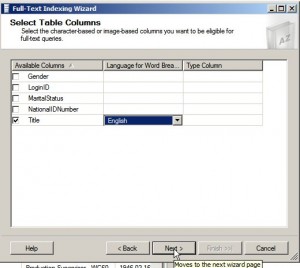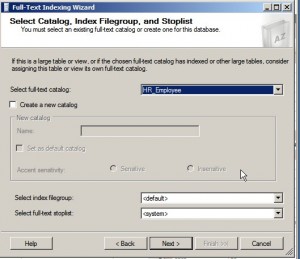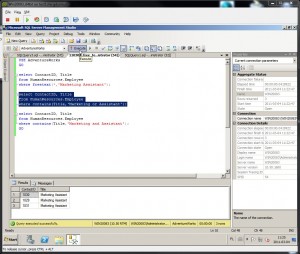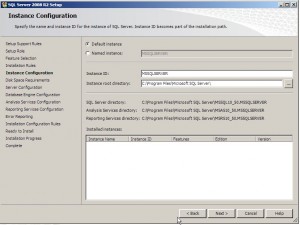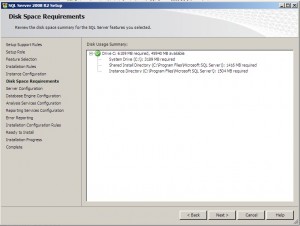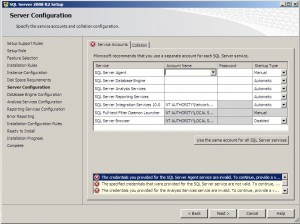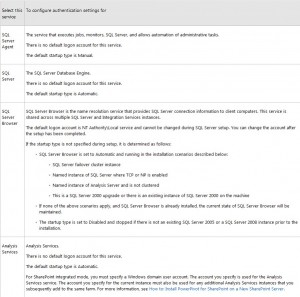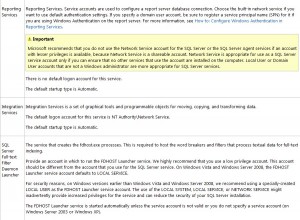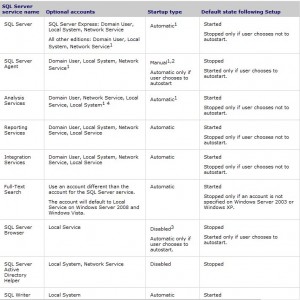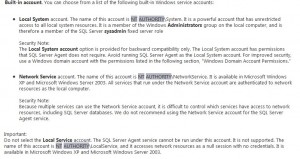19 września 2013
MSSQL backup
17 września 2013
10 marca 2011
MsSQL server – managing server agent jobs (F1)
Job is a container for MsSQL Agent.
Jobs (i inne np. metadata) are stored in MSDB (system database)
System Database jest instalowane podczas instalacji danej instancji. (master, model, tempdb, msdb)
Master – zawiera procedury i obiekty systemowe.
Model – gdy tworzymy nową instancję to jej parametry (domyślne) są pobierane z bazy Model.
SSIS – SQL Server Integration Services
Maitenance plans
7 marca 2011
MsSQL Agent Service (SQL Server Agent) (F1)
Serwisy dla danej instancji serwera MsSQL. (automatyzacja, notyfikacja, multi-server administration)
Komponenty:
- jobs
- operators – odbiera notyfications from jobs and alerts
- alerts
- proxies – credential pozwalające na dostęp np do sieci
- schedules
4 marca 2011
MsSQL – Database mail, full text search. (F1)
Ze strony http://sqlserversamples.codeplex.com/ pobieram bazę testową: AdventureWorks2008R2_SR1.exe
Aby free text search działał trzeba utworzyć full text katalog i free text index. Można mieć tylko jeden fee text index na tabelę lub widok. Full text katalog zawiera fee text index.
Z tego poziomu można utworzyć nowy full text catalog lub użyć wcześniej przygotowanego
Aby uruchomić dane zapytanie trzeba je zaznaczyć i wtedy “Execute”:
3 marca 2011
MsSQL 2008 (F1)
BI Business Intelligence, w jego skład wchodzą:
SSIS (SQL Server Integration Services – for import and export)
SSRS (SQL Server Reporting Services – dane z SSIS lub bazy i prezentacja np w sposób graficzny)
SSAS (SQL Server Analytical Services (OLAP) )
T-SQL – Transact SQL
Stored procedure – skompilowany kod przechowywany w bazie, wywoływany po nazwie
2 marca 2011
MsSQL 2008 installation (F1)
SQL Server 2008
Enterprise – pełna funkcjonalność, działa tylko na serwerach
Developer – pełna funkcjonalność, działa na serwerach i stacjach roboczych – nie wolno używać do produkcji
Evaluation – pełna funkcjonalność, do demonstracji
W tą wersją wchodzą funkcjonalności:
Klastry do 16 nodów, mirroring, mirroring, BI – business inteligence
Standard edition (pozwala na 2 node clustering)
Express – 1 CPU, 1 GB RAM, 4 GB DB
Service Accounts – konto domenowe, lub lokalnego OS. Używane tylko dla danego serwisu a nie do logowania. NIE UŻYWAĆ KONT Z ADMINISTRACYJNYMI UPRAWNIENIAMI SYSTEMOWYMI LUB DOMENOWYMI.
Instance – an installation of a SQLServer engine (DB – database engine, AS - analysis services, RS - reporting services, IS – integration services)
SSIS – System Server Integration Services – można kopiować instancje na nowy serwer.
Pierwsza instalacja – default instance, pozostałe to named instances.
Sprawdzenie wersji Microsoft.NET Framework – run -> %systemroot%\Microsoft.NET\Framework (%systemroot% – wskazuje na katalog windows)
run -> msinfo32
Podstawowa instalka:
Database Engine Services
Clinet Tools Connectivity
SQL Server Books Online
Management Tools – Basic
Management Tools – Complete
SQLCMD – command line dla MSSqlServera (istnieje też stara wersja OSQL), DAC – dedicated administrative connection
sqlcmd -S nazwa_hosta
1>select name from sys.databases (catalogue view lub internal view)
2>go (dopiero teraz wyświetli wyniki zapytania)
BCP – bulk copy program – imports, exports
SQLDiag - diagnostyka
Resource Governor – użycie CPU, RAM
SQL Server Configuration Manager – tu widać jakie serwisy są uruchomione.
SQL Server Management Studio (SSMS)
Warto doinstalować SQL Server features discovery report. (z t0olsów z instalki)
24 lutego 2011
MsSQL 2008 R2 installation.
SQL Server supports multiple instances of SQL Server on a single server or processor, but only one instance can be the default instance. All others must be named instances. A computer can run multiple instances of SQL Server concurrently, and each instance runs independently of other instances.
Failover cluster instances only — Specify the SQL Server failover cluster network name. This name identifies the failover cluster instance on the network.
Default or Named instance — Consider the following information when you decide whether to install a default or named instance of SQL Server:
- If you plan to install a single instance of SQL Server on a database server, it should be a default instance.
- Use a named instance for situations where you plan to have multiple instances on the same computer. A server can host only one default instance.
- Any application that installs SQL Server Express should install it as a named instance. This will minimizes conflict when multiple applications are installed on the same computer.
On the Server Configuration — Service Accounts page, specify login accounts for SQL Server services. The actual services that are configured on this page depend on the features that you selected to install.
You can assign the same login account to all SQL Server services, or you can configure each service account individually. You can also specify whether services start automatically, are started manually, or are disabled. Microsoft recommends that you configure service accounts individually to provide least privileges for each service, where SQL Server services are granted the minimum permissions they have to have to complete their tasks.
Uprawnienia jakie należy nadać dla odpowiednich kont:
Zalecenia odnośnie uprawnień:
Źródła:
http://msdn.microsoft.com/en-us/library/ms143531.aspx
http://www.mytechmantra.com/LearnSQLServer/Install_SQL_Server_2008_R2_P3.html
http://technet.microsoft.com/en-us/library/ms143504.aspx
http://www.kajware.pl/program-hotelowy/instalacja-ms-sql.html





